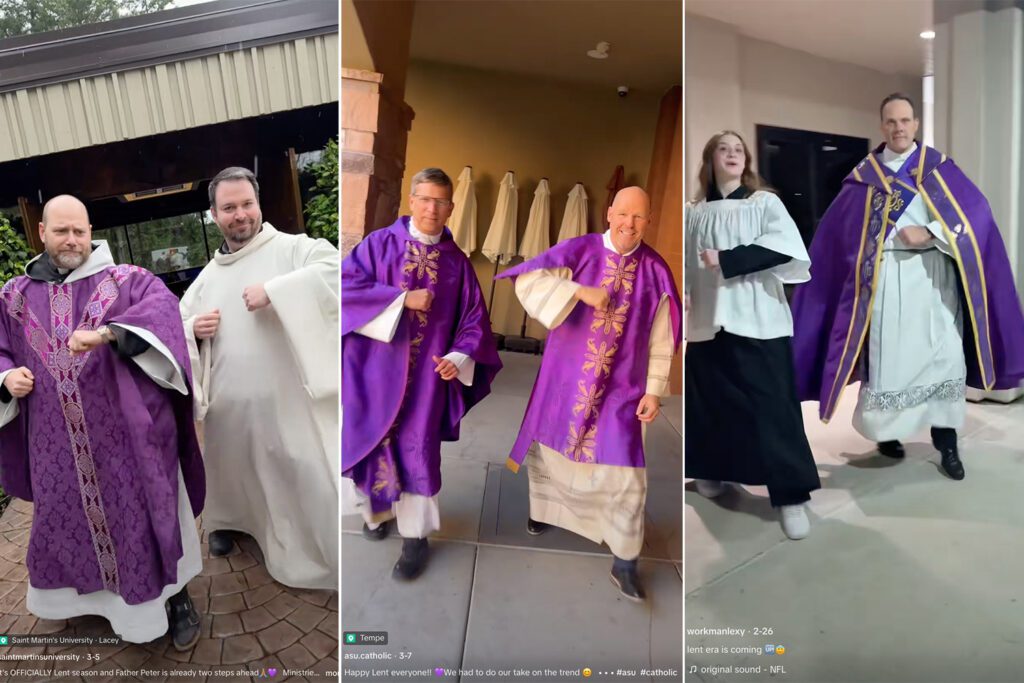With a Catholic clergy Lenten dance trend, a callout by pastor and Sen. Raphael Warnock and a prominent place in sermons by Black pastors, Kendrick Lamar’s ‘Not Like Us’ is having a religious moment.
By Aleja Hertzler-McCain
(RNS) — In the moments before Kendrick Lamar launched into his Grammy-winning diss track, “Not Like Us,” at the Super Bowl, a quartet of background dancers asked him, “You really ’bout to do it?” It was seemingly a question about the legal risks of blasting rival rapper Drake as a pedophile on the most-watched halftime show of all time.
A little over two weeks later, that same audio played over a TikTok video of Catholic deacon David Workman and his daughter, Lexy, with the caption “lent era is coming.” Playing off a secular dance trend, as the first riffs from “Not Like Us” begin, Workman changes from green Ordinary Time vestments to purple Lenten ones. The deacon from the Diocese of Beaumont, Texas, copies Lamar’s walking dance steps with his daughter backing him up in altar server surplice.
After the video posted to Lexy’s TikTok account received over 34 million views and 5 million likes, the Catholic priests got on board. Dancing to the diss track became a trend to hype up congregants and social media users for Lent.
For example, on Ash Wednesday, the Rev. Peter Tynan, St. Martin’s University Benedictine chaplain, and campus ministry director Nick Coffman posted their own “Not Like Us” dance with a caption listing Mass times. Two days later, the Rev. Aaron Qureshi and deacon Wayne Rich at Arizona State University’s Newman Center jumped on the minitrend. Each video racked up millions of views.
All the participants in the Catholic mini TikTok trend appear to be white, despite the track’s complicated politics around Black identity.
The diss track is culmination of a rap feud that involves serious allegations. Lamar accused Drake of being a pedophile, appropriating Black culture without an authentic relationship with it, hiding secret children and having alcohol and gambling addictions. Drake accused Lamar of abuse and infidelity in his relationship. Drake’s lawyers filed a defamation lawsuit against his and Lamar’s record label Universal Music Group, arguing it launched a campaign to make a hit out of “Not Like Us” while the label knew it contained false criminal accusations against him.
In many ways though, the general public responded to “Not Like Us” like any other chart-topper, dancing and singing along at parties, sports stadiums, and school dances. Clergy’s social media videos are just the latest evidence of that.
This past weekend, the diss track’s prominence in Christian circles reached new heights as Georgia Sen. Raphael Warnock — who is senior pastor at Atlanta’s Ebenezer Baptist Church, the Rev. Martin Luther King Jr.’s home church — called Lamar “a prophet” at a political rally for fellow Georgia Democrat Sen. Jon Ossoff in Atlanta. Warnock referred to the song to criticize President Donald Trump and his allies.
“They don’t understand what it’s like to have to ration your prescription drugs, or what it’s like to try to figure out how to afford groceries, even the price of a dozen eggs,” Warnock said. “In the words of that prophet who just spoke at the Super Bowl, ‘They not like us.’”
Since the track’s May 4, 2024, release, Black pastors have also quoted the song in viral moments. Even beyond those Internet moments, prominent Black congregations have heard sermons about “Not Like Us.” For example, last July, the Rev. Kevin Johnson, pastor at New York’s Abyssinian Baptist Church, preached a sermon on the song calling for unity.
“While we may not fully grasp the intricacies of Drake and Kendrick Lamar’s feud, there’s something here we all understand intimately, and that is differences,” Johnson said. “Oh yes, church, we understand disagreements. We understand quarrels. We understand tiffs.”
Johnson’s election as Abyssinian’s pastor last year could be seen as one of those disagreements, with some community members criticizing the selection process, in which Johnson ended up the sole candidate on the congregational ballot, as flawed. One reverend filed a gender discrimination lawsuit against the church.
Referencing a Juneteenth performance where Lamar claimed to have members of rival Los Angeles gangs together on stage, Johnson preached, “If Drake and Kendrick Lamar can get two rival gangs, the Bloods and the Crips, to come together and to sing ‘Not Like Us,’ we ought to be able to come together as a church.”
Not all sermons referencing the track have been complimentary. In an August sermon at Trinity United Church of Christ in Chicago, the megachurch former President Barack Obama attended for two decades, the Rev. Michael Eric Dyson, a Vanderbilt University African American and diaspora studies professor, sharply criticized Lamar’s framing of Black identity, especially his accusation that Drake, a Canadian with a white Jewish mother, is a “colonizer,” not a “colleague.”
“The politics of Black authenticity have been played on this continent since the beginning of our bodies reaching America,” said Dyson, who also noted Lamar defended a white rapper in 2015.
Dyson continued, “Saying that Drake is ‘Not Like Us’ was a rhetorically interesting move, but historically and ethnographically and anthropologically and sociologically and theologically and darn common-sensically, it just don’t work.” Dyson argued that the two rappers would receive the same treatment “under cover of dark…if they start shooting” and that Drake’s Jewish identity played into Lamar’s critique.
On criticism of Drake’s Canadian roots, Dyson reminded the congregation that enslaved Black people in the U.S. escaped to Canada. “There are Black people, believe it or not, in Canada,” he said.
But from the very same pulpit came an entirely different sermon last month as Senior Pastor the Rev. Otis Moss III called Lamar’s Super Bowl appearance “a visual sermon.” Moss linked the Super Bowl show to American politics and showed images of the performance.
“It is here that Kendrick Lamar critiques an America that wants a monarch and not a president, wants a king and not an executive officer,” Moss said. “The poet is speaking to a nation that has become enamored with a monarch that does not have a moral compass.”
First published March 25, 2025



